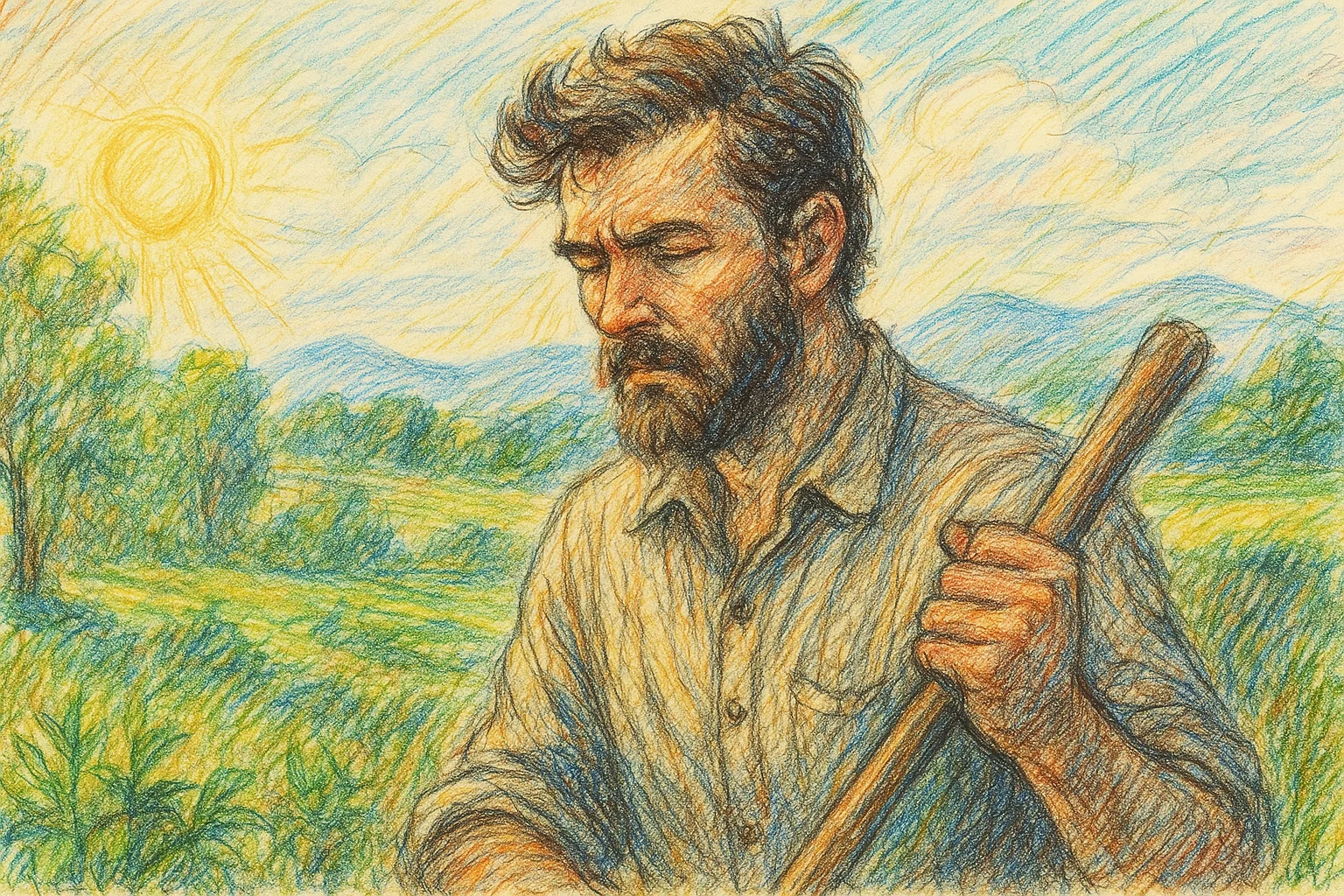When Even Non-Duality Fails
“If—”
By Rudyard Kipling
If you can keep your head when all about you
Are losing theirs and blaming it on you,
If you can trust yourself when all men doubt you,
But make allowance for their doubting too;
If you can wait and not be tired by waiting,
Or being lied about, don’t deal in lies,
Or being hated, don’t give way to hating,
And yet don’t look too good, nor talk too wise:
If you can dream—and not make dreams your master;
If you can think—and not make thoughts your aim;
If you can meet with Triumph and Disaster
And treat those two impostors just the same;
If you can bear to hear the truth you’ve spoken
Twisted by knaves to make a trap for fools,
Or watch the things you gave your life to, broken,
And stoop and build ’em up with worn-out tools:
If you can make one heap of all your winnings
And risk it on one turn of pitch-and-toss,
And lose, and start again at your beginnings
And never breathe a word about your loss;
If you can force your heart and nerve and sinew
To serve your turn long after they are gone,
And so hold on when there is nothing in you
Except the Will which says to them: “Hold on!”
If you can talk with crowds and keep your virtue,
Or walk with Kings—nor lose the common touch,
If neither foes nor loving friends can hurt you,
If all men count with you, but none too much;
If you can fill the unforgiving minute
With sixty seconds’ worth of distance run,
Yours is the Earth and everything that’s in it,
And—which is more—you’ll be a Man, my son!
The Poem in Plain English
- Stay steady when others panic: Keep a cool head even if people blame you unfairly. Trust yourself, yet recognise others’ doubts.
- Wait and act cleanly: Be patient; don’t slip into lies or hatred, and avoid showing off.
- Use dreams and thoughts as tools, not masters: Imagine and reason, but don’t become enslaved by either.
- Treat success and failure alike: Meet both victory and defeat with equal calm.
- Rebuild when things collapse: If your hard work is ruined or twisted, pick up the scraps and build again.
- Risk and resilience: Be willing to stake everything, lose, and begin anew without self-pity.
- Dig deeper than exhaustion: When strength fades, let sheer will carry you the final stretch.
- Mix with anyone without losing yourself: Move easily among all classes, untouched by arrogance or resentment.
- Guard your heart from praise or insult: Let neither friends nor opponents wound your centre.
- Make every minute count: Pour full effort into each moment; life then grants its fullest scope.
Living After Realisation
A plain-English bridge between non-duality and Kipling’s “If—”
Non-duality says the unmanifest and the manifest are one. The moment we describe that unity, we split it into “speaker” and “spoken-about.” Words create the very duality they deny, so talking can never finish the subject. Yet life goes on in traffic jams, bills, and relationships. How can someone who has glimpsed the silence still move through the noisy world without sliding into endless argument or blind materialism? Kipling’s poem offers a set of street-level practices.
1. Accept the tongue-tie, then act anyway
“If you can keep your head when all about you are losing theirs…”
Realisation brings a shock: there is nothing new to say. Rather than debating the point, keep your head in everyday situations— queues, quarrels, deadlines. Quiet presence is the only credible proof of non-dual insight.
2. Let thought and dream serve, not rule
“If you can dream—and not make dreams your master;
If you can think—and not make thoughts your aim…”
You still need plans: rent is real. Draw them, but know they are sketches on water. Hold them lightly so they guide without chaining you. Non-duality sees plans as useful fiction, not ultimate truth.
3. Meet praise and blame as passing weather
“Triumph and Disaster… treat those two impostors just the same.”
Success can still puff up the ego you thought was gone; failure can still tempt you into a victim story. Bow to both, then move to the next ordinary task—send the résumé, wash the dishes, phone a friend. Let applause and criticism pass through like wind in an open room; balance keeps insight from hardening into superiority or despair.
4. Re-enter the marketplace with beginner’s tools
“Stoop and build ’em up with worn-out tools.”
After a spiritual detour, a career reboot may feel clumsy. Use what you have—old skills, free courses, modest contacts. The point is not glory but participation. Work becomes a dojo where unity is tested under pressure.
5. Risk without clinging
“Make one heap of all your winnings and risk it on one turn…”
You will stake time, effort, maybe savings on new ventures. Do it eyes open, ready to lose, ready to start again. Detachment is not laziness; it is the freedom to move when conditions change.
6. Draw on will when energy fades
“Hold on when there is nothing in you except the Will which says to them: ‘Hold on!’”
Meditation highs pass; fatigue, doubt, and family tension return. In those low tides, fall back on simple resolve: breathe, take the next necessary action, rest when you can. Endurance converts lofty insight into lived fibre.
7. Walk with crowds, dine with “kings,” stay ordinary
“Talk with crowds and keep your virtue, or walk with Kings—nor lose the common touch.”
Non-duality wipes away status lines, so practise everyday respect in both directions. Speak clearly and courteously to the shop assistant and the CEO. Plain speech here means honest, human-to-human language—no grovelling upward, no dismissal downward. If someone credits you for your calm, share the method, not the ego: “It’s daily practice, not magic.”
8. Fill the minute fully, then let it go
“Fill the unforgiving minute with sixty seconds’ worth of distance run…”
Attention is the one resource that proves unity: when you are fully present, there is no gap between seer and seen. Pour that presence into each minute—typing, laughing, grieving—then release it and meet the next.
The Transition in One Breath
Realisation shows there is nowhere to arrive—yet breakfast still needs cooking. Kipling’s lines give the stride: stay steady, loosen your plans, rebuild after every collapse, risk without clinging, endure, mingle, and inhabit each moment fully. And yes, the mind will never hold a permanent “no-thought” plateau; physiology keeps pulling us back into dual perception. Acknowledge that swing instead of chasing an extreme. Walk the middle path: unity expressed through repeated, practical action.
Applying Kipling’s Wisdom to Everyday Challenges
1. Harmony under One Roof
Wherever people share space—partners, relatives, flat-mates—friction flares. The first stanza’s counsel to “keep your head” and “make allowance” reminds us that calm listening outperforms reactive blame. Trade accusations for curiosity: What does the other person fear or need right now? Patience becomes the quiet room where conflict cools.
2. Dreams, Plans, and Reality
Ambition fuels progress, but when “dreams become the master” they create pressure and disappointment. Use goals as compasses, not shackles: draw a plan, revisit it monthly, and allow revisions. Likewise, relentless thinking can turn into paralysis; schedule regular “no-thinking” intervals—walks, breath practice, gardening—to reset.
3. Riding Highs and Lows in Work and Money
Income may swing, savings may shrink, markets may ignore your best effort. Kipling calls Triumph and Disaster “impostors”: treat a job offer or a rejection letter as passing weather. Celebrate wins briefly, study losses briefly, then return to steady action—updating your skills, networking, applying again. Emotional evenness conserves energy for the next move.
4. Rebuilding after Setbacks
A project can fail, a savings pot can drain, a relationship structure can crack. The second stanza’s image of stooping to rebuild “with worn-out tools” urges pragmatic resilience: use whatever is at hand—community resources, free training, small gigs—to restart. Pride slows recovery; humility speeds it.
5. Courage to Risk and Begin Again
Playing safe sometimes feels wiser, yet growth needs calculated leaps. The third stanza’s wager—risking the “heap of all your winnings”—echoes every career pivot, business launch, or relocation. Decide how much you can afford to stake, accept the possibility of loss, and promise yourself silence instead of self-reproach if it goes wrong. The lesson is not recklessness but freedom from clinging.
6. Endurance When Will Outlasts Flesh
Job hunts, caregiving seasons, or personal healing can exhaust body and nerves. Kipling’s call to make “heart and nerve and sinew serve” after strength is gone recognises a universal limit: when stamina fades, purpose must speak. A short mantra—“Hold on for ten more breaths”—can bridge the gap until rest is possible.
7. Standing Tall among Crowds and “Kings”
Success may invite praise, status meetings, or media glare; struggle may immerse you in queues and forms. The final stanza urges equal poise in either setting. Ground yourself in simple routines—cooking, sweeping, phone-free evenings—so neither applause nor criticism inflates or deflates your core.
8. Making the Minute Forgiving
Life’s true currency is attention. “Fill the unforgiving minute” is a call to be fully present—writing the application, washing dishes, playing with a child—so each slice of time becomes complete, not haunted by what-ifs.
The Quiet Reward
If—” is often read as a call to heroic steadiness—anchored in human resilience. Its pulse is simple composure: refuse to let circumstance, praise, fear, or fatigue hijack your centre. Live by that rhythm and the outer puzzles—money worries, career turns, relationship storms, spiritual doubts—lose their sting. What remains is a person who can stand in any weather, mend what breaks, and keep life’s heartbeat moving, one measured minute at a time.
Living Meaningfully After a Collapse of Belief
This research looked at adults in the United States and Europe who lost a core belief system—often through trauma or a deep existential crisis—and then had to rebuild a sense of meaning without slipping back into rigid dogmas or drifting into nihilism. Using academic papers, first-person testimonies, therapy resources and forum discussions, we asked: What inner mind-sets and outward habits actually help people live well after their worldview collapses?
Key findings
Face reality as it is, even when it hurts.
- People who recovered best practised “radical acceptance”: they stopped fighting the facts of loss, uncertainty and mortality, and channelled their energy into what they could still influence.
Claim the steering wheel.
- After the old authority (church, ideology, role) disappeared, flourishing survivors decided, “I give myself permission to choose my own values.” This shift from external to internal authority was crucial.
Treat the crisis as compost for growth.
- Many reported post-traumatic growth: deeper appreciation of life, stronger relationships, new possibilities and creative bursts. They viewed the collapse not as the end, but as raw material for a wiser life.
Create something—anything—out of the chaos.
- Writing, painting, music, coding, gardening: creative acts turned pain into tangible form, provided catharsis and often connected them with others who resonated.
Help someone else; purpose follows.
- Volunteering, mentoring or simply caring for family gave immediate meaning. Service redirected attention from inner void to outer impact and proved life can still matter.
Put your day on rails.
- Simple routines—regular wake time, exercise, study blocks—gave structure when everything felt formless. Small daily wins rebuilt confidence and momentum.
Practise mindful silence.
- Meditation, quiet walks or solo time in nature helped them befriend uncertainty, calm anxiety and experience moments of peace without needing grand explanations.
Re-weave community ties.
- Joining support groups, interest clubs or new friendship circles countered loneliness and provided shared meaning. Connection was the strongest antidote to existential isolation.
Meaning is made, not found.
- Ultimately, survivors realised life doesn’t hand out a pre-printed purpose; purpose is crafted through chosen values, relationships and actions. This mindset proved more resilient than the old, inherited beliefs.
Action beats overthinking.
- Those who moved—took the class, wrote the song, signed up to volunteer—rediscovered meaning faster than those who waited for philosophical certainty. Doing generates clarity.
Dig deeper: see the attached PDF for the full research and detailed findings.
When every label—religious, atheist, non-dual—has worn out, what’s left is raw experience and practical choice.
Use reality as the only altar.
- The chair under you, the breath in your lungs, the person across the table—these are unquestionable. Begin and end the day by noticing them as they are, without story. That keeps the mind from floating off into metaphysical extremes.
Treat ideas as tools, never homes.
- Beliefs are like screwdrivers: pick one up when a job needs doing, set it down when it slips. The moment a concept starts telling you who you are, put it back in the toolbox.
Let “Universe” be shorthand and move on.
- If you need a placeholder for the unnameable, “Universe” is gender-neutral and agenda-free. But don’t worship the word; use it the way sailors use the word “ocean”—a pointer to the vastness they navigate, not an idol on the deck.
Anchor the nervous system, then act.
- Two steady meals
- One honest conversation
- Twenty minutes of movement
- Five deliberate breaths when emotion spikes
Meet those four body-mind needs daily. They quiet the biochemical hunger that keeps the brain begging for new certainties.
Measure life by contribution, not conviction.
- At week’s end ask: Did something I did lighten a load, mend a thing, open a possibility? If yes, you’re aligned. If no, adjust. This yardstick works whether the cosmos is divine, indifferent, or unknowable.
Keep a pocket of silence.
- Schedule ten undistracted minutes—no mantra, no goal—just listening. Silence is the pressure-valve that stops concepts from hardening into creeds.
Expect the pendulum, aim for the mean.
- Some days you’ll feel boundless, others painfully separate. That swing is physiology, not failure. Note the arc, steer toward the centre, carry on.
You have now watched belief fall, rise, and fall again. Each time, something in you wanted a stable name to grab, but every name dissolved in the hand. Let that be a lesson rather than a wound. The mind is free to question, life is free to move, and meaning is free to be made fresh.
Keep two things. Keep the breath that proves you are here, and keep the choice that lets you answer this moment with care. Call the mystery Life, Universe, Nothing, or remain silent. Labels do not feed a hungry neighbour or mend a cracked doorframe; your actions do.
So take the tools you have, build what helps, share what heals, rest when you are tired, and laugh when you can. If someone asks what guides you, point to the small good you are doing right then. That is plenty.
God or no God, devotion or rejection, myth or reason—none of it changes the task in front of you.
You are here. Life is already happening. The argument over what’s behind it all—sacred, random, or unknowable—doesn’t water the plants, return the phone call, or mend the torn silence between two people.
So leave the cosmic debate to drift like clouds. Your task is simpler, harder, and more direct: take life as it is, and live.
Show up. Do your best.
Breathe when it hurts. Rest when you can.
Laugh if it comes, and keep building something that matters—even if no one is watching.
You can chase doctrines across a lifetime—holy books, atheism, psychedelics, non-duality, nihilism—and still circle back to the same bare floor: you are alive, now. All the paths are useful only because they finally dissolve and show what was here before the first step: breathing, feeling, choosing.
So accept the full range: some days you live in sorrow and exit in silence; other days you blaze with purpose and fall like a hero. Either way, the assignment never changes: meet the moment, do the next honest thing, and let life finish the sentence.
That is enough. That is everything.







